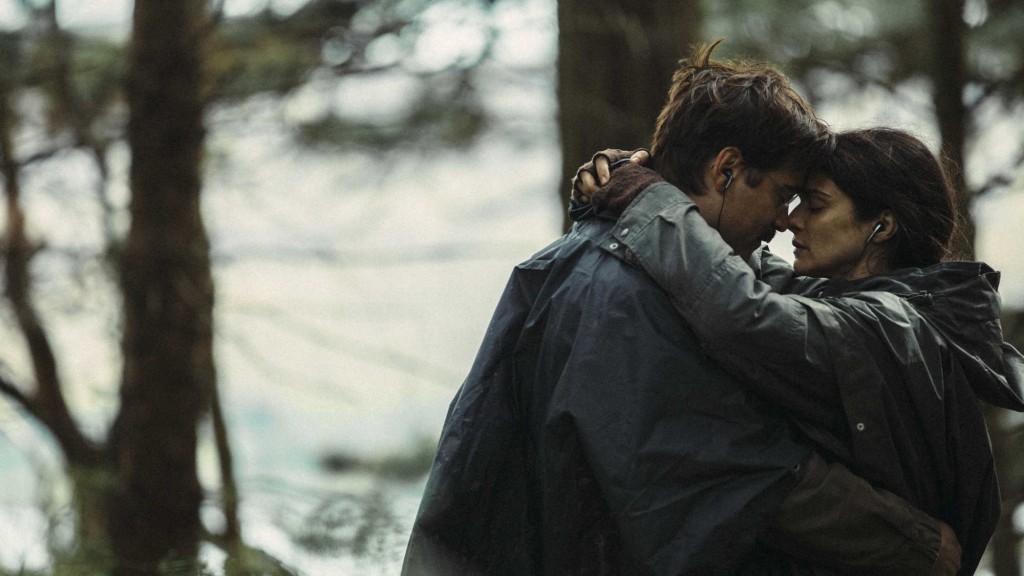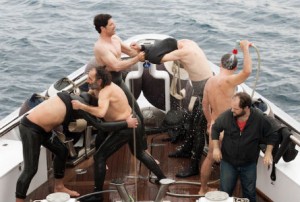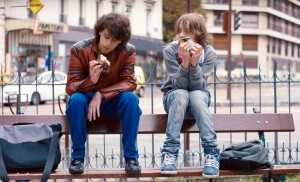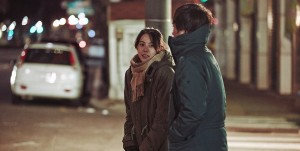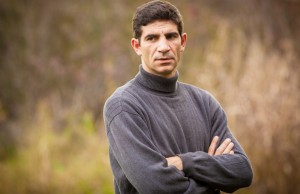By Gary M. Kramer.
The 53rd New York Film Festival runs through October 11 and there are several outstanding features by established and returning filmmakers playing at the fest. Here is a rundown of five notable films.
Athina Rachel Tsangari has been chosen as the official New York Film Festival Filmmaker in Residence, and her entry, Chevalier, which she directed and co-wrote (with Efthymis Filippou), is a blistering satire of the fragile male ego. Six men, a Doctor (Yorgos Kendros), his colleague Christos (Sakis Rouvas), an insurance salesman, Yannis (Yorgos Pirpassopoulos) and his brother Dimitris (Makis Papadimitriou), as well as Josef (Vangelis Mourikis) and Yorgos (Panos Koronis) are spending a holiday on a yacht in the Aegean Sea. One night, while playing a game, they decide to compete for who is “The Best at Everything,” comparing any and every possible measurement. For example, how one sleeps: Is their posture good? Do they snore or drool? Are they in the nude or wearing nice underwear? The winner of all the contests gets the coveted Chevalier ring. The contest is a ripe opportunity for Tsangari to puncture the men’s vanity and ego. They worry about their appearance, which ranges from balding and fat thighs to the (in)ability to get an erection. They judge each other on how they speak, sing, dance, laugh, and walk, their cleaning skills, their building skills, their blood tests, and, how quickly someone responds to a call for help. They form hypotheses on why one man might have a ringtone that sounds like a frog.
What emerges is a darkly comic investigation of male human nature, competitiveness, and insecurity, in which every word and every reaction is measured and judged. The point is to examine how people express themselves, especially when they are under scrutiny. How the characters behave throughout the contest—providing apologies, excuses, challenges, and arguments, and forming alliances—is witty and engaging. The film is a kind of comedy of manners where shame and pride and talent and daring are criticized and celebrated. It is to Chevalier’s credit that all the characters exhibit their strengths and weaknesses so that there is a real tension that builds as things come down to a rivalry between two top players. The entire ensemble cast is game for their parts, and uniformly strong; each actor gets a distinctive, indelible moment on screen.
Tsangari’s masterful tone ranges from deadpan comic to pure absurdist at some moments (which are best left to be discovered). The film also includes some funny voice-overs that interrupt the action from time to time, announcing things like a change to the evening’s dessert course. Chevalier, in a sense, plays a game with the viewer, asking audiences to judge it. And therein lies its best quality: When there is a reveal at the end, the film is both funny and satisfying. Also from Greece—and also co-written by Efthymis Filippou—is The Lobster, the arch and stunning new film from writer/director Yorgos Lanthimos (Dogtooth (2009)). The film takes place in a futuristic society where single people are sent to The Hotel for forty-five days with the expectation that they find a suitable partner, or they will become an animal of their choosing. David (Colin Farrell) is one such single man, and his experiences in The Hotel involving dances, hunts, and lessons on why it is better to be coupled.
Lanthimos, like Tsangari, takes an absurdist, deadpan approach to the material, creating a savage critique of conformity. The film is hilarious as actions, thoughts, dialogues, and emotions are precisely rendered and scrutinized. As people are coupled up based on their matching characteristics, from limps and nosebleeds to an inability to express feelings, David tries to adapt to the rules of The Hotel. He eventually makes his way into The Woods, where the hunts are held to allow a single person to extend their stay, and their chance to stay human longer. In The Woods, however, there is a whole new set of rules—especially when love develops between characters.
The Lobster is darkly, acidly funny as it raises ideas about civilization vs. barbarism with some very disturbing behavior and punishments. Farrell, who along with his co-star Rachel Weisz (who narrates), give terrific, affectless performances that are perfectly suited to the provocative, allegorical material. The title characters in Microbe and Gasoline, a fanciful new film written and directed by Michel Gondry, are Daniel (Ange Dargent), a hopeless romantic and artist, and Theo (Théophile Baquet), a grease monkey. These 14 year-olds meet in school in Versailles, confiding in each other about sex, girls, bullies, and families. The pair acknowledge they “can’t blossom in this lousy environment,” and take to the road in a makeshift mobile home they build out of spare parts salvaged from a junkyard.
Gondry’s film will delight viewers who suspend their disbelief and go along for the ride. The two-kids-on-an-adventure plotline is merely an excuse for the playful writer/director to hang a series of inventive episodes that show the boys bonding. In one set piece, Theo mimics being at a crowded party when he enters an empty art gallery hanging Daniel’s work. In another amusing sequence, a soccer goal is replayed in slow motion. The tone gets slightly wilder after the boys take to the road, and have strange encounters with a dentist (Laurent Poitrenaux) who takes them in, or when Daniel tries to get his haircut at a Korean massage parlor, which leads to some trouble. Microbe and Gasoline is really about these two outsiders trying to secure some form of freedom as well as find their place in the world. Like many of the man-boy protagonists Gondry features in his films (The Science of Sleep (2006), Mood Indigo (2013), and The We and the I (2012)), the characters seek love and acceptance—but on their own terms. Daniel’s crush on his classmate Laura (Diane Besnier) goes through a series ups and downs that signify how one must take charge of one’s life. And while the small Daniel (nicknamed “Microbe”) bemoans that he “wants to be like everyone else,” Theo shows him how much better being different is. Gondry’s whimsical style is never forced, and he coaxes charismatic performances from his two young actors. This may be why this film’s familiar message charms rather than annoys.
Hong Sang-soo (Hill of Freedom (2014)) returns to the New York Film Festival with his enchanting drama, Right Now, Wrong Then. A diptych, it tells the same story—a would-be romance between a young female artist, Hee-jung (Kim Min-hee) and a filmmaker, Ham Cheon-soo (Jung Jae-young). The pair meet in Suwon, where he has arrived a day early for a screening and discussion of one of his films. The couple talks over coffee, during a visit to her studio where she paints, at a sushi bar, and then at a party with some of her friends. They separate before his appearance the next day. Hong employs a simple, talky, improvised format that involves long takes and expressive performances from his two main actors.
The first half of Right Now, Wrong Then sets the stage, with the characters being polite and getting to know one another. As they drink at the sushi bar, they let down their guards, and at the party, Cheon-soo’s words are used against him. Sang-soo’s close-up on Hee-jung’s face at a particularly critical moment, and the impact of what has transpired is not lost on Cheon-soo the next day. Which is why when the characters get a “do-over” in the film’s second half, the film becomes all the more engrossing. While the narrative starts out the same way, and follows much of the same action, there are differences not only in the dialogue, but also in the activities. This time around, he senses self-pity in her painting; she tells him to “think before he speaks.” Suddenly, the characters are more honest and open with one another, less polite, and at the sushi bar, Cheon-soo boldly declares his love for Hee-jung, which intoxicates her, despite a complication. At the subsequent party, Cheon-soo behaves badly, but Hee-jung only learns about his indiscretion later, and has a different reaction to it. Ultimately, what emerges from this variation is a story of impulse and control, and Hong masterfully keeps his fans on tenterhooks as the characters dance around their feelings, masking their true desire in their careful (and sometimes careless) thoughts and comments. Right Now, Wrong Then is a sensitive romantic drama that may seem slight at first, but everything resonates more deeply given the variations on the first half.
Romanian filmmaker Corneliu Porumboiu (When Evening Falls on Bucharest, or Metabolism (2013)) also returns to NYFF this year with The Treasure, a canny and compelling film that builds suspense as its characters are on the brink of discovery. Costi (Cuzin Toma) is reading Robin Hood to his young son Alin (Nicodim Toma) when his neighbor Adrian (Adrian Purcarescu) rings his doorbell asking for 800 Euros. Costi explains he cannot lend Adrian the money, but Adrian returns later that night with a story about his grandfather’s buried treasure, and the opportunity to split the loot if Costi can help him secure a metal detector to locate and unbury it.
Intrigued by the idea, Costi makes some risky decisions at home and work to assist Adrian. He visits a company to hire the metal detector and is told that he must, according to national patrimony laws, report anything he finds to the police to confirm if the treasure is of historic importance. He also meets Cornel (Corneliu Cozmei) who offers to do work with Costi for a reduced fee, and that he can keep (not report) the riches if they find anything. Porumboiu sets the stage for a morality play, and adds little details, like Costi having a debate about his lying with his boss, and lecturing Alin on how to handle a bully. However, the tone of The Treasure is more comic than dramatic. While there is a discussion of the Revolution of 1848, and a thin critique of Communism, the bulk of the film depicts Costi and Adrian’s efforts to find treasure in Adrian’s family’s backyard. The anxieties build as the characters dig and dig; perhaps digging themselves into a metaphoric hole. If the film touches on issues of personal responsibility and accountability, Porumboiu introduces a last act twist that makes the characters’—and by association the audiences’—desire to find something worthwhile. Well-acted and directed, The Treasure yields many pleasures.
Gary M. Kramer is the author of Independent Queer Cinema: Reviews and Interviews, and co-editor of the recently published Directory of World Cinema: Argentina.

